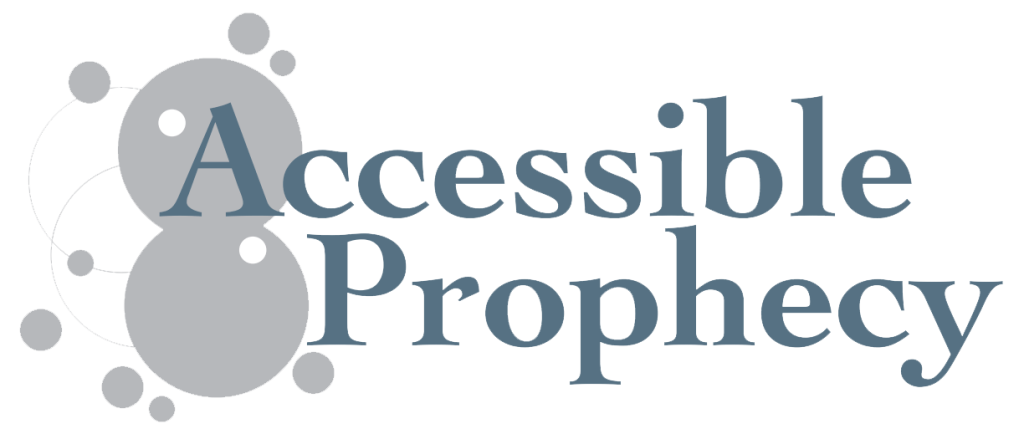“Was that really the voice of God?”
We all have moments when we question our own ability to hear God clearly; and in late 2020 many of us have misgivings about the ability of the prophets to have any kind of idea of what God may be saying about world events. How can we determine what an authentic prophetic ministry is, whether it belongs to us or someone else?
Doubt is a normal part of any exploration of prophetic gifts and ministry. For those of us taking our first baby steps in listening to God we are bound to question our own prophetic experiences until we become more confident in our ability to recognise the particular tone and content of Jesus’ voice. And even for those of us who have been using prophetic gifts for years, I believe that it’s appropriate and healthy to hold things lightly, to be cautious, and to ask questions of what we think God is saying. We are all learners. We should never assume we get it 100% right and we certainly need our Christian communities to help us with discernment and accountability; especially when we claim to be hearing God for other people.
I love prophetic ministry, which we can define as seeking God’s heart for those around us. The New Testament teaches us that we can all learn to use the gift of prophecy, and 1 Corinthians 14:3 is clear that this wonderful gift does so much to strengthen, encourage and comfort other people. But in pursuing this gift we also need to recognise the huge responsibility involved, particularly as we move from:
Hearing God for ourselves
To hearing God for someone else (personal prophecy)
To hearing God for the bigger picture (public prophecy)
If we claim to speak for God we have to ensure that we have been ruthless in setting aside anything that might conspire to twist, distort or filter the true word of God. In order to tune into God’s voice we have to learn to tune out all the other voices that are fighting for our attention, and some of these “other voices” are very subtle and deceptive.
- They may be issues of the heart, such as emotional pain, fear, hurts, unforgiveness, brokenness, and trauma.
- They may be issues of the mind, such as our mindsets, prejudices, world-views, belief systems, opinions, ideologies, judgments, and theology.
But these all have the ability to cloud our prophetic perception. If we are going to hear God clearly we have to surrender them back to God.
As I’ve observed many different expressions of prophetic ministry over the years there are two particular scenarios that concern me, ones where I see many mistakes being made:
- Emotionally charged environments
- Politically charged environments
It is really hard to hear God clearly and precisely in these contexts and even experienced prophets may miss the mark.
When a dear friend of mine is desperately ill in hospital, I know that the voice of my emotions is going to be very loud, and I’m extremely cautious not to confuse their voice with the voice of God. In any situation where there are a lot of emotions involved we have to exercise considerable vigilance when seeking to hear from him.
I believe that it’s even harder to hear God about some of the political issues that have dominated our collective consciousness in recent years. Not impossible; but it’s so hard because, certainly here in the UK, we cherish (and even idolise) our carefully nurtured opinions. Politics is a big part of life, and now, with social media, everyone has an opinion. Personal biases that have been shaped by our upbringing, culture, and experience can have a devastating impact on our prophetic perception. And the stakes seem so high. For those of us in the UK and US, as politics has heated up in recent years, it seems that any public prophecy, whether speaking into Brexit or American politics, is taking place in a context that is both emotionally and politically charged.
Getting our agendas, opinions and feelings out of the way is hard enough when prophesying over an individual. But it’s ten times harder when prophesying over a nation.
It’s not at all surprising that many “big name” prophets have got things wrong recently. I personally think part of the problem is that the rest of the church venerates them too much: we have slipped into an Old Testament mindset: “I can’t hear God for myself – I need a prophet to tell me what God is saying”.
If you want to be able to hear what God is saying about Trump, Brexit, Boris or the EU, please understand that you don’t have to go to a prophet. The remarkable Spirit of Truth has been given to you and you can ask him yourself. It is his delight to search the heart of the Father and make his thoughts known to you. But I’d strongly recommend you also follow these three steps:
1. Ask yourself “Why?” Why do you want to hear God about that particular issue? The main reason God speaks to us about global events is so that we will pray. So will you faithfully commit to pray about these things?
2. Stay rooted in love: love for God, love for his world, and love for our leaders – especially the ones we disagree with.
3. Ruthlessly and radically surrender all your opinions, agendas and feelings before God. This may takes days, weeks or years. Consider carefully the warnings in Jeremiah 23:16 and Ezekiel 14:3 which indicate the perils of inquiring of God through the lenses of our own understanding and our idols. The aim is to be an empty vessel that God can fill with his pure revelation. Humble yourself and remember the wisdom of Proverbs 3:5-6 “Lean not on your own understanding; in all your ways submit to him.”
As well as ensuring our own prophetic perception is untainted, we want to be able to weigh and discern other prophetic voices that we come across. The New Testament makes it clear we should test all prophecies. It’s hard to weigh and test strident prophetic voices when they speak so loudly about issues and claim the Bible backs them up. But we all have the Holy Spirit. And most importantly we all have the beautiful image of Jesus before us. As we seek to weigh other people’s prophecies we can ask, “Does this look like and sound like Jesus?”
Prophets will make mistakes. Well known prophets will get things wrong. We are all seeing through a glass darkly (1 Corinthians 13:12). But this should never be a reason to avoid the precious gifts of the Spirit. Prophecy has been used to abuse, manipulate and control people. It has been used to push political agendas. But the beautiful Spirit of Truth has never abandoned the church of Jesus. And he loves a humble heart.
“But when he, the Spirit of Truth, comes, he will guide you into all the truth.” John 16:13

